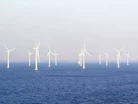Orsted/BASF sign 25-year wind power purchase agreement

In a joint announcement, Orsted and BASF reported the conclusion of a 25-year fixed-price corporate power purchase agreement (CPPA). As part of the agreement, BASF will offtake the output of 186 megawatts from Orsted’s Borkum Riffgrund 3 Offshore Wind Farm planned for the German North Sea.
Borkum Riffgrund 3 Offshore Wind Farm
Expected to have a total capacity of 900 megawatts and begin commercial operations in 2025, Orsted has recently secured the necessary planning approval from theGerman Federal Maritime and Hydrographic Agency (BSH).
The CPPA marks the first step for the companies to invest in their aligned future supporting the reduction of emissions in the chemical industry and will help to cover the electricity needs of low-emission technologies for BASF, furthering its mission to be carbon neutral by 2050.
A 25-year agreement
Running for 25 years, the CPPA signed by Orsted and BASF is the longest for offshore wind ever announced. It is an important step for Orsted to take final investment decision on Borkum Riffgrund 3.
The offshore wind farm was the world’s first large-scale farm of its kind to be awarded a zero bid, made possible by the installation of next-generation technology, favourable site conditions, and anticipated revenue-stabilising power purchase agreements with partners like BASF.
“This supply agreement with Ørsted is another important step in securing additional renewable energy for BASF. BASF wants to reduce its CO2 emissions by 25% by 2030 compared with 2018. To achieve this ambitious goal, we will have to replace large amounts of fossil energy with renewable energy within the coming years. Ørsted can provide the required additional quantities through the construction of new wind farms to support us in our energy transformation,” said Dr. Martin Brudermüller, Chairman of the Board of Executive Directors of BASF SE.
“In the common fight against climate change, it’s partners like BASF that will make the difference. The chemical sector has a challenging path towards decarbonisation, but it will also make one of the biggest contributions,” said Mads Nipper, CEO of Ørsted.
“For this reason, countries like Germany must respond to the enormous demand for renewable electricity by urgently making more seabed available for offshore wind projects and by increasing its ambitions for deploying large-scale renewable energy sources such as offshore wind power. Offshore wind in the North Sea and the Baltic Sea is an abundant source of green electricity that can be unleashed through clearer and more ambitious policies. With our vision of a world that runs entirely on green energy, we aim to further accelerate the build out of renewable energy and support partners like BASF in realising their climate ambitions.”
“Ørsted and BASF share a vision that innovative, zero-emission technologies like large-scale offshore wind can play a significant role in the emission reductions in the chemical industry,” say both CEOs, Brudermüller and Nipper.

